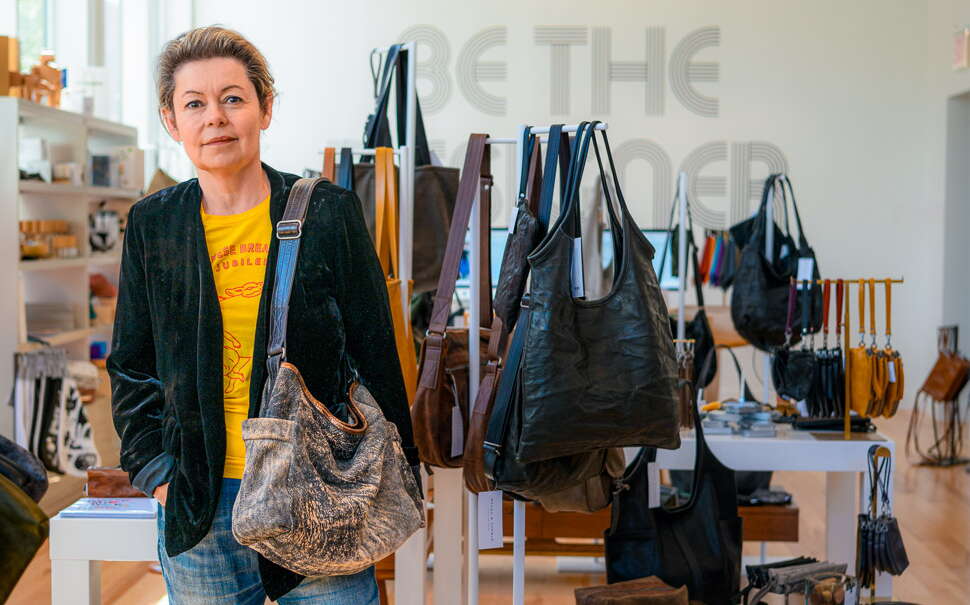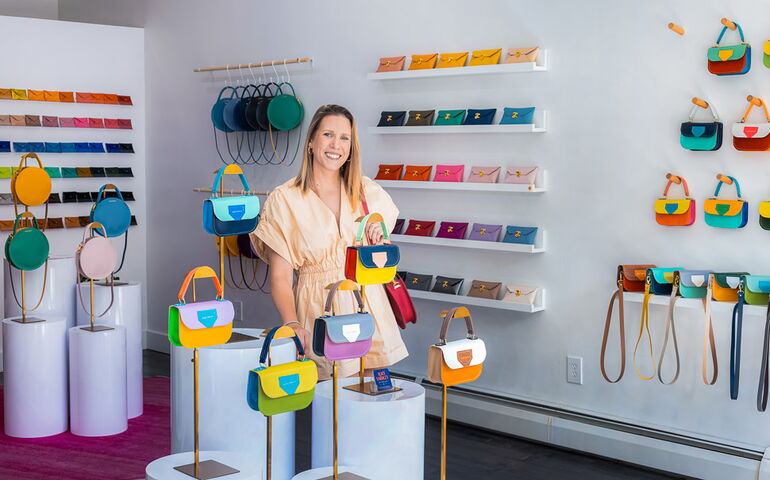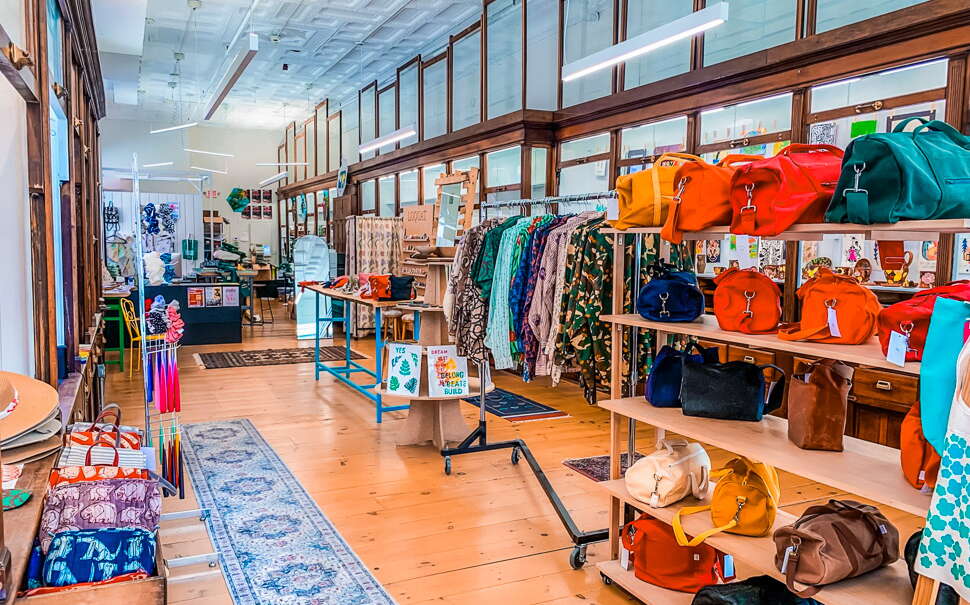
Processing Your Payment
Please do not leave this page until complete. This can take a few moments.
Maine fashion brands call Portland their new home
 Photo / Tim Greenway
Alice Yardley, namesake of Alice Yardley Maine, opened a store at 99 Exchange St. in the Old Port to showcase her handbag designs.
Photo / Tim Greenway
Alice Yardley, namesake of Alice Yardley Maine, opened a store at 99 Exchange St. in the Old Port to showcase her handbag designs.
A host of small Maine fashion brands that started out as ideas developed in studio apartments, pop-ups or workshop space are now getting a retail foothold in the Old Port and Arts District areas of Portland.
The brands grew out of second careers or pandemic pivots.
Three clothing and accessory designers have recently opened new storefronts in Portland and have big plans for the future.
“We are poised to expand our offerings of special one-of-a-kind experiences. What we have always modeled lends itself to the new ways in which retail is thought of,” says Natasha Durham of Rough & Tumble, which opened a store on Middle Street this past summer.
Another designer, Alice Yardley, says her new Old Port retail space “was the perfect first step for a small business.”
From home sewing machine to Old Port space
Yardley is the creative force behind the handbag maker Alice Yardley Maine, a handcrafted leather brand, designs and hand-makes leather handbags, focusing on vibrant colors, classic shapes and a cheerful vibe.
While still teaching art in New York City, the Portland native started creating handbags on a sewing machine in a tiny studio apartment in Brooklyn, N.Y. For materials, she used leftover textiles, fabric and leather from upholstery shops in Brooklyn.
“I’ve always loved fashion and accessories and studied art and art history in college, so my work is a reflection of all of my aesthetic preferences,” says Yardley. “I’m endlessly inspired by Italian art, culture and daily life. So my transition into leatherworking felt like a natural step.
“Teaching will always have a very special place in my heart, but I was ready to begin creating again for myself,” she continues.
In 2019, she moved back to Portland and wasn’t sure what her next career move would be. But she knew she wanted to continue working with leather as a hobby.
When the COVID-19 pandemic hit a few years later, she used the quarantine to hone her craft, create a business plan and build inventory. Yardley reached out to developer Jake Edwards, who owns the Black Box pop-up sites on Washington Avenue in Portland, and secured a pop-up space.
“I continued to grow my brand and designs for about three years in the incubator space, and I’m so incredibly grateful to have had a space like that,” says Yardley. “It was the perfect first step for a small business and provided a safety net that wouldn’t have been possible without the incubators.”
In 2020, in the pandemic, she participated in New York Fashion Week’s “Ones to Watch” showcase.
In March of this year, Yardley opened a storefront at 99 Exchange St.
She is working as a one-woman show and trying to figure out how to increase production without losing quality.
“I’m definitely using this first calendar year in the space to look at patterns, trends and sales so that I can get an idea of how best to grow my business in 2025,” says Yardley.
Leather goods designer Rough & Tumble
In 2020, Rough & Tumble was featured on a Times Square billboard that gained the attention of actress Allison Janney, giving a shot of momentum for the Brunswick-based leather goods store.
Rough & Tumble started in 2008 as a second career for founder and creative director Natasha Durham, who spent 20 years as a chef.
“I only knew that I wanted to trade in my mise en place for a different kind of luxury material,” says Durham.
Today, the brand sells its bags through prominent catalog brands. Its leathers are sourced primarily from France and Italy. The company has a design studio in Brunswick.
And now, in July, Rough & Tumble took another big step, moving into 2,126 square feet of storefront space at 178 Middle St. in Portland.

As with so many companies, Rough & Tumble began almost unintentionally. Durham said she was actually in the middle of designing a line of children’s clothing when she came up with a tote consisting of sewn-together rectangles of silk.
“In 2008, I happened to put together a simple tote for a trip,” says Durham. “I hadn’t sewn in 20 years since my son Halley was a baby. As simple as it was, fashioning this three-dimensional useful object was the puzzle I had been looking for.”
After that Durham cultivated a following through a website built with son Halley’s help. Within six months of starting the brand, Rough & Tumble had backorders of 16 weeks.
“The balance of building demand and meeting demand is today still on the forefront of strategy,” says Durham. “Being committed to keeping production in Maine has been challenging in terms of meeting demand, but has kept our quality high. This allows us to manage quality in real time, not after the fact.”
Durham opened a workshop in Norway, Oxford County, where she was able to take a small team of leather artisans and build the company.
She later moved the operation to an 8,000-square-foot space at Fort Andross in Brunswick. The firm added a director of marketing and built relationships with Sundance and Garnet Hill, both of which had strong catalog businesses.
“We have shipped our ‘Made in Maine’ handbags to almost every country,” says Durham. “We even filled an order shipped to the Vatican.”
But the missing piece was a retail location where shoppers could see the bags in person.
At the Old Port store, clients can book a “Be the designer” session with a specialist and get a one-on-one design consultation. The store offers wedding participants the option where, for example, bridesmaids can design a clutch for the ceremony.
Guests can choose a gift card with a design session. The Portland store is available to book for design parties.
For more of a standard shopping experience, the store offers a range of handbag designs, including the 1903 and 1904 packs, the Boho, Original City Safari and the Hobo Pack.
“As retail is changing, we recognize that we have always been forward-thinking in terms of the retail experience. This is not new to us,” says Durham.
A clothing and accessory designer
Loquat is a fashion and apparel brand created by Bermuda native Jordan Carey, who conceived the idea as a thesis while at Maine College of Art & Design.
He started at the Portland college with the intention of becoming a painter but ended up in fashion and textile design — a pursuit his mother encouraged him to follow from the start.
After graduation, he started making leather bags from upcycled materials to raise funds for future projects. When he had a couple of dollars in his pocket, there was space to start getting more conceptual.
After graduation, he worked as an assistant designer for the fashion house Jill McGowan in Portland.
He later launched the Loquat brand with Madison Poitrast-Upton, a Portland fashion and textile artist who earned a bachelor of fine arts at the Maine College of Art & Design in 2020.
(Loquat is a variety of plum tree common in warmer climates.)

“From designing custom fabric to fundraising through our various products, I very quickly felt that the Portland community welcomed Loquat,” says Carey.
In May, Loquat opened in Mechanics’ Hall, at 521 Congress St., in Portland’s Arts District.
“It was just time,” says Carey. “Loquat had outgrown the apartment and after our initial pop-up, we had proof of concept. I was hungry for more and I felt that the community was too. The artists vending in our 2.5-month pop-up had made over $25,000 for their businesses.”
Artists and artisans can still show their work through Loquat, but there’s now more space. Beyond that, Carey wants to open the space for events and book signings, as well as classes and workshops.
“Loquat had something to say and it wasn’t just going to be our voice; it was the voice of everyone we were working with, representing and fighting for,” says Carey.














0 Comments